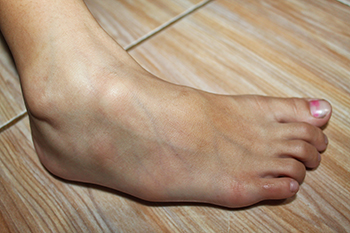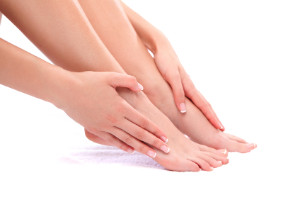Items filtered by date: March 2023
Drinking Water and Stretching May Help to Prevent Running Injuries

Preventing injuries to the feet is an important part of the running routine. Avid runners often know the importance of tracking their shoes’ mileage, and many will have at least two pairs. The average running shoe is replaced between 300 and 500 miles and may vary with individual gaits, or running styles. It is beneficial to properly warm up and cool down before and after running. Dynamic stretching, consisting of side shuffles, walking, and lunges are done before running, and static stretches can be done after the run. These are stretches that target the glutes, calves, and hamstrings and are beneficial in keeping the body loose. Muscle cramps may be prevented by drinking plenty of water before, during, and after running. On the days when the body is resting from running, many people choose to add a full-body workout, which is an effective way of building muscular endurance. If you would like additional information about how running injuries can affect the feet and how to prevent them, it is suggested that you confer with a podiatrist.
All runners should take extra precaution when trying to avoid injury. If you have any concerns about your feet, contact Shaun J. Limon, DPM and Lisa Griffith-Limon, DPM of Limons Foot & Ankle Care. Our doctors will treat your foot and ankle needs.
How to Prevent Running Injuries
There are a lot of mistakes a runner can make prior to a workout that can induce injury. A lot of athletes tend to overstretch before running, instead of saving those workouts for a post-run routine. Deep lunges and hand-to-toe hamstring pulls should be performed after a workout instead of during a warmup. Another common mistake is jumping into an intense routine before your body is physically prepared for it. You should try to ease your way into long-distance running instead of forcing yourself to rush into it.
More Tips for Preventing Injury
- Incorporate Strength Training into Workouts - This will help improve the body’s overall athleticism
- Improve and Maintain Your Flexibility – Stretching everyday will help improve overall performance
- “Warm Up” Before Running and “Cool Down” Afterward – A warm up of 5-10 minutes helps get rid of lactic acid in the muscles and prevents delayed muscle soreness
- Cross-Training is Crucial
- Wear Proper Running Shoes
- Have a Formal Gait Analysis – Poor biomechanics can easily cause injury
If you have any questions, please feel free to contact our office located in Lakewood Ranch, FL . We offer the newest diagnostic and treatment technologies for all your foot care needs.
Working On Your Feet May Cause Injuries

Foot comfort is essential to have at all times, and especially during the work day. Many people have jobs that require mandatory standing during the majority of the day, which may lead to foot injuries. Research has shown there are two categories of foot injuries that can happen while working. Sprains, punctures, cuts, or similar injuries comprise one area and injuries that occur from slipping and tripping fall into another category. Additionally, many people develop ingrown toenails, calluses, or blisters from wearing shoes that do not fit correctly. Most injuries can cause discomfort, fatigue, and pain, and may affect the foot muscles and joints. It is beneficial for companies to provide stress mats for their employees to stand on, in addition to providing ample time for breaks. If you would like more information about how to protect your feet while working, it is suggested that you confer with a podiatrist who can provide you with the information you are seeking.
While working on the feet, it is important to take the proper care of them. For more information about working on your feet, contact Shaun J. Limon, DPM and Lisa Griffith-Limon, DPM from Limons Foot & Ankle Care. Our doctors will treat your foot and ankle needs.
Working on Your Feet
Standing on your feet for long periods of time can cause stress and pain in your feet. Your whole body may experience change in terms of posture, back pain, bunions, callouses and or plantar warts. There are ways to avoid these conditions with proper foot care, smart choices and correct posture.
Positive Changes
Negative heeled shoe – Choosing this shoe type places the heel slightly lower than the ball of the foot. These are great for overall foot health. Find shoes that fit you correctly.
Go barefoot – Our feet were not designed to be enclosed for all hours of the day. Try to periodically expose your feet to air.
Eliminate Pain
Foot Exercises – Performing simple exercises, incorporating yoga and doing stretches are beneficial. This will allow increased blood flow to the area and muscles of the foot.
Achilles tendon – Stretching the foot out flat on the floor will relax the calf muscles and tendon. These exercises can be performed almost anywhere. Make sure you add these exercises to your daily regimen.
With a little bit of this information and knowing more about foot health, you will notice changes. Foot stretches and proper footwear will help with pain and prevent further issues.
If you have any questions please feel free to contact our offices located in Bradenton and Lakewood Ranch, FL . We offer the newest diagnostic and treatment technologies for all your foot and ankle needs.
Dealing With Mallet Toe

One of several common toe deformities is mallet toe. Common causes of mallet toe include the imbalance of muscle and bones, where the toe bones are too short and the muscles too weak. This imbalance forces the tip of the toe to curl under. Mallet toe commonly affects any of the three middle toes of the foot. It can also be caused by an injury, arthritis, and improperly fitting footwear. People who wear high heels with narrow toe boxes are more at risk for developing mallet toe. Other factors include genetic makeup and toe length. If the 2nd and 3rd toes are longer than the big toe, mallet toe may result. In some cases mallet toe problems can be eased simply by changing the type of shoe you wear, but in more severe cases, surgery to release the tendon and straighten the toe is an option. Recovery time for this type of surgery can take up to two months. If a mallet toe is giving you problems, it is suggested that you make an appointment with a podiatrist for an examination and a treatment plan.
Toe pain can disrupt your daily activities. If you have any concerns, contact Shaun J. Limon, DPM and Lisa Griffith-Limon, DPM of Limons Foot & Ankle Care. Our doctors can provide the care you need to keep you pain-free and on your feet.
What Causes Toe Pain?
Most severe toe pain is caused due to a sports injury, trauma from dropping something heavy on the toe, or bumping into something rigid. Other problems can develop over time for various reasons.
Toe pain can be caused by one or more ailments. The most common include:
- Trauma
- Sports injury
- Wearing shoes that are too tight
- Arthritis
- Gout
- Corns and calluses
- Hammertoe
- Bunions
- Blisters
- Ingrown toenails
- Sprains
- Fractures (broken bones)
- Dislocations
When to See a Podiatrist
- Severe pain
- Persistent pain that lasts more than a week
- Signs of infection
- Continued swelling
- Pain that prevents walking
Diagnosis
In many cases the cause of toe pain is obvious, but in others, a podiatrist may want to use more advanced methods to determine the problem. These can range from simple visual inspections and sensation tests to X-rays and MRI scans. Prior medical history, family medical history, and any recent physical traumatic events will all be taken into consideration for a proper diagnosis.
Treatment
Treatments for toe pain and injuries vary and may include shoe inserts, padding, taping, medicines, injections, and in some cases, surgery. If you believe that you have broken a toe, please see a podiatrist as soon as possible.
If you have any questions please feel free to contact our offices located in Bradenton and Lakewood Ranch, FL . We offer the newest diagnostic tools and technology to treat your foot and ankle needs.
Parts of the Foot That Are Prone to Stress Fractures

Many people will continue to walk and stand if they have a stress fracture in their foot, despite the pain it may bring. Stress fractures generally happen from overuse and are a common injury among runners. They are small or hairline cracks in the foot bones that bear the weight of the body. The repetitive force that comes from running and jumping activities may result in a stress fracture and will become worse if not promptly treated. A stress fracture can cause the bones to become weak, and a boot or cast may be worn for stability as the affected foot heals. The parts of the foot that are most affected are the heel bone, the second and third metatarsal bones in the midfoot, or one or more of the bones in the ankle joint. The symptoms that can accompany this type of injury can include pain, bruising, tenderness, and swelling. If you have endured a stress fracture in your foot, it is suggested that you consult with a podiatrist for a diagnosis and suggested treatment options.
Stress fractures occur when there is a tiny crack within a bone. To learn more, contact Shaun J. Limon, DPM and Lisa Griffith-Limon, DPM from Limons Foot & Ankle Care. Our doctors can provide the care you need to keep you pain free and on your feet.
How Are They Caused?
Stress fractures are the result of repetitive force being placed on the bone. Since the lower leg and feet often carry most of the body’s weight, stress fractures are likely to occur in these areas. If you rush into a new exercise, you are more likely to develop a stress fracture since you are starting too much, too soon. Pain resulting from stress fractures may go unnoticed at first, however it may start to worsen over time.
Risk Factors
- Gender – They are more commonly found in women compared to men.
- Foot Problems – People with unusual arches in their feet are more likely to develop stress fractures.
- Certain Sports – Dancers, gymnasts, tennis players, runners, and basketball players are more likely to develop stress fractures.
- Lack of Nutrients – A lack of vitamin D and calcium may weaken the bones and make you more prone to stress fractures
- Weak Bones – Osteoporosis can weaken the bones therefore resulting in stress fractures
Stress fractures do not always heal properly, so it is important that you seek help from a podiatrist if you suspect you may have one. Ignoring your stress fracture may cause it to worsen, and you may develop chronic pain as well as additional fractures.
If you have any questions, please feel free to contact our offices located in Bradenton and Lakewood Ranch, FL . We offer the newest diagnostic and treatment technologies for all your foot care needs.


